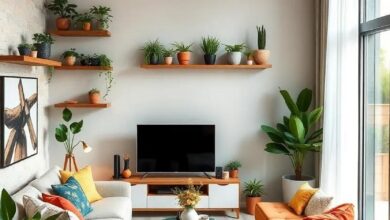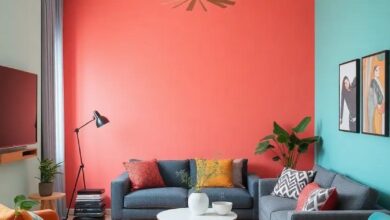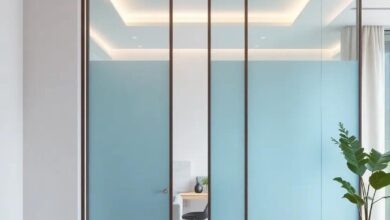Embracing Serenity: The Allure of Soft Minimalist Living Rooms in Light Tones
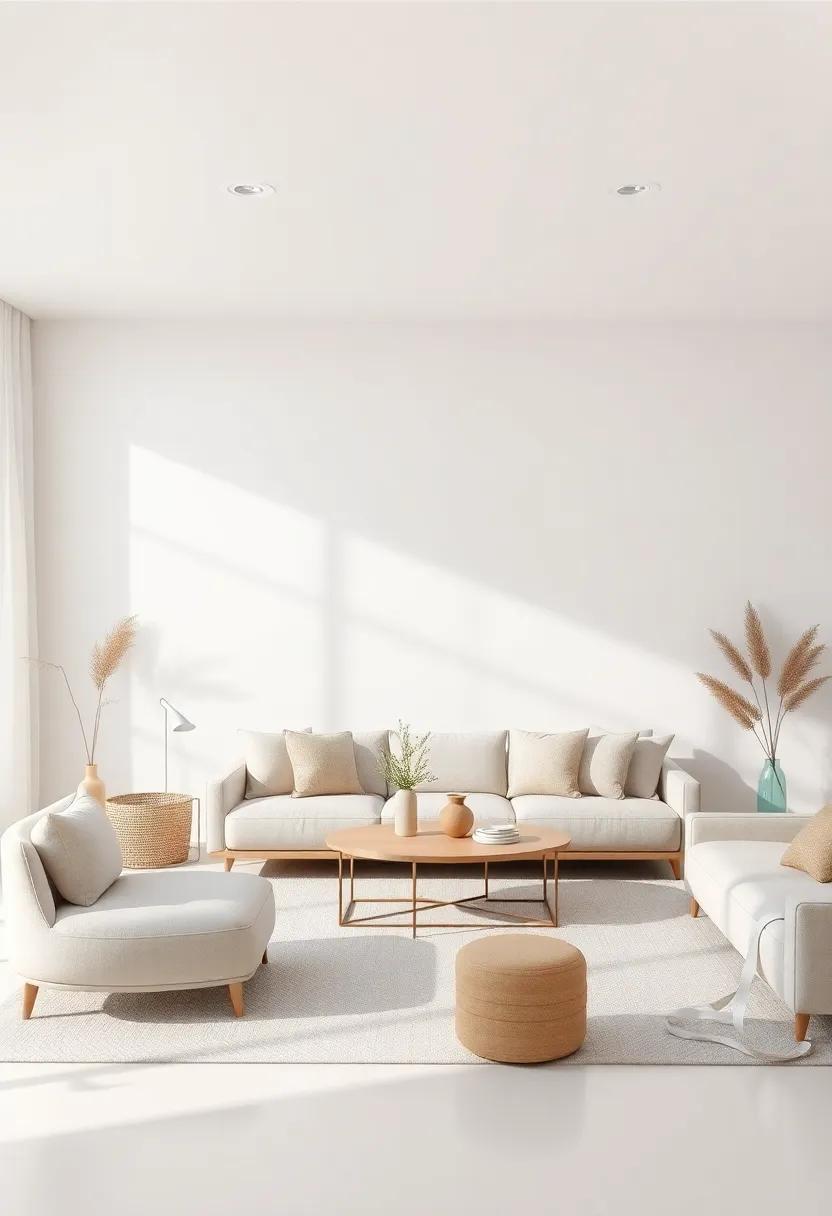
In a world that frequently enough feels cluttered and chaotic, the allure of soft minimalist living rooms in light tones serves as a gentle reminder of the beauty found in simplicity. Embracing serenity, these tranquil spaces invite us to pause, breathe, and appreciate the understated elegance of sparse decor and muted hues. With an emphasis on clean lines and open spaces, soft minimalist living rooms create an atmosphere that nurtures peace and clarity amidst our busy lives.In this exploration, we delve into the principles of soft minimalism, uncovering how light tones not only elevate aesthetic appeal but also foster a profound sense of calm. Join us as we uncover the nuances of this design philosophy and inspire your journey towards a serene sanctuary in your home.
The Essence of Soft Minimalism in Living Spaces
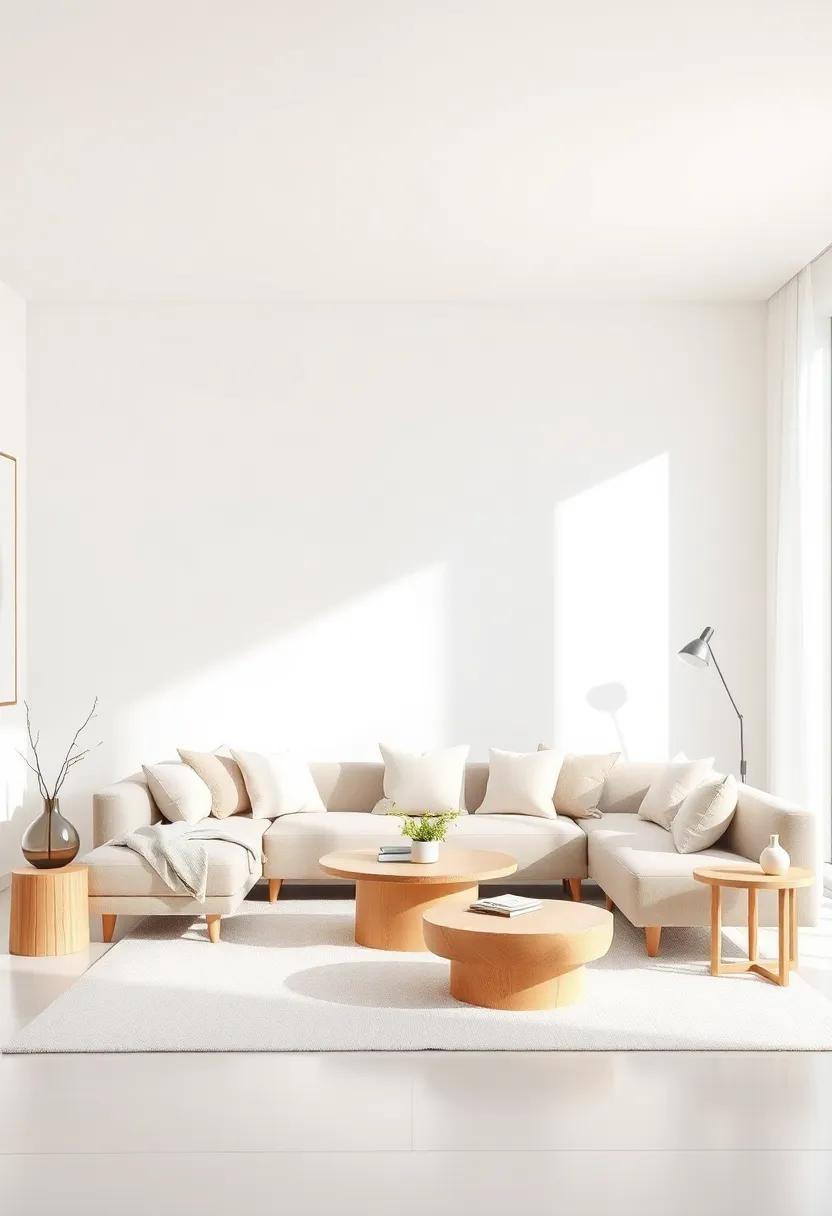
Soft minimalism invites tranquility into living spaces by emphasizing functionality paired with aesthetic appeal.The palette frequently enough features muted, light tones that evoke feelings of calm and spaciousness. When crafting a soft minimalist room, consider incorporating elements such as:
- Natural materials: Wood, rattan, and stone can unify the space, adding warmth without overshadowing simplicity.
- textured Fabrics: Soft linens and cottons enhance comfort, contrasting the clean lines of minimalism.
- Purposeful Décor: Choose a few art pieces or plants that resonate with personal style, ensuring they contribute to, rather than clutter, the atmosphere.
In a soft minimalist living room, negative space plays a crucial role. The careful arrangement of furniture fosters an environment where each piece is intentional. A thoughtfully designed layout can include:
| element | function |
|---|---|
| Low-profile sofa | Encourages relaxed seating without overwhelming the space. |
| Simple coffee table | Acts as a focal point while being unobtrusive. |
| subtle lighting | Enhances mood without harsh shadows. |
A Palette of Light Tones: Crafting a Tranquil Atmosphere
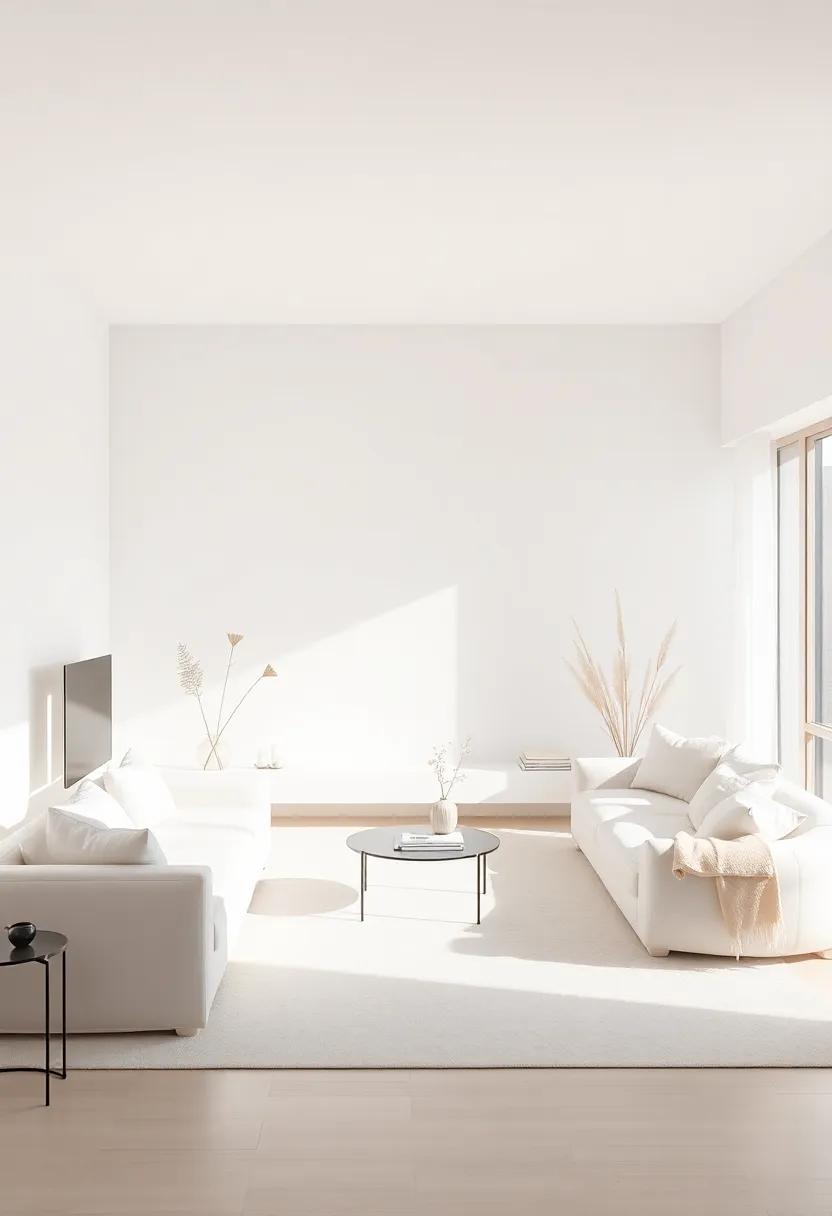
In a world frequently enough filled with chaos and noise, the gentle embrace of light tones can transform a living space into a serene oasis. These soft hues invite a sense of calm and clarity,creating an environment that encourages relaxation and introspection. Imagine the soothing influence of colors like pale beige, soft creams, and whispering greys delicately layered in your room. Each shade works in harmony, reflecting natural light to create an atmosphere that feels spacious and inviting.Key elements of this design theme might include:
- Textured Fabrics: Linen or cotton cushions that add depth without overwhelming the senses.
- Natural Materials: Wood, stone, and glass accents that enhance the organic feel.
- Subtle Patterns: Discreet designs in rugs and art that offer interest while maintaining tranquility.
To underscore this calming aesthetic,consider incorporating greenery into the space. Plants not only introduce a refreshing contrast but also filter the air, enhancing the overall vitality of your surroundings. Pairing light tones with greenery can create a harmonious balance, making a living room feel like a breath of fresh air.The beauty of this approach lies in its versatility; it can effortlessly adapt to personal preferences while fostering an atmosphere of peace. Here are a few suggestions for simple yet impactful decor elements:
| Element | Description |
|---|---|
| light Drapes | Allow natural light while providing privacy. |
| Neutral Artwork | Art pieces in soft tones that blend seamlessly. |
| Throw Blankets | Cozy additions that enhance color cohesion. |
Embracing Natural Materials for an Inviting Touch
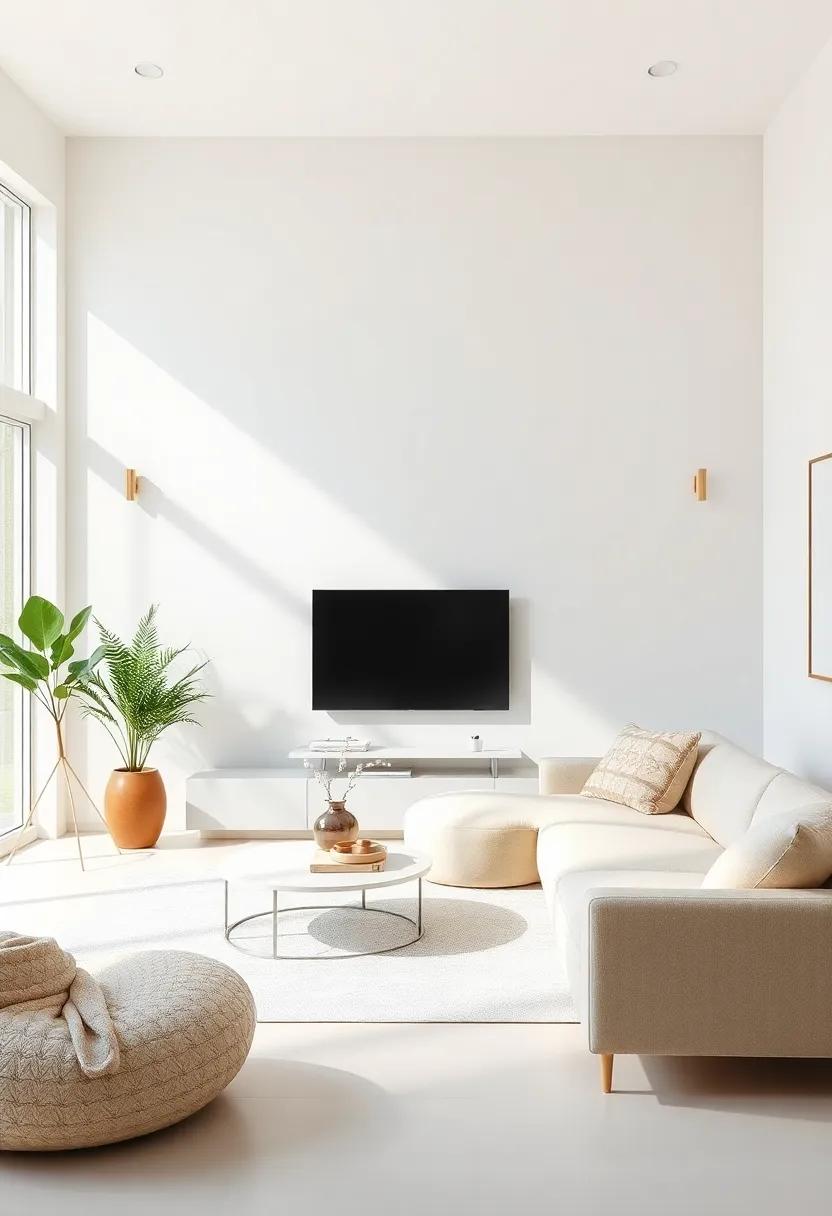
In a soft minimalist living room, the warmth of natural materials can transform a space from stark to inviting. Incorporating elements such as wood, bamboo, and linen creates a sense of harmony that resonates with the tranquility of light tones. Highlighted by their organic textures, these materials not only enhance aesthetic appeal but also promote a soothing atmosphere. When selecting pieces for your space, consider items that reflect nature’s beauty, such as:
- Reclaimed Wood Furniture: Adds character and history.
- Bamboo Accents: Lightweight and eco-friendly.
- Linen Drapes: Soft and breathable, allowing gentle light filtration.
In addition to these materials, incorporating natural fibers such as jute or wool in rugs and cushions can provide tactile warmth and coziness. To achieve a cohesive look, pair these textures with light neutral shades; soft creams, pale grays, and muted greens work beautifully to enhance the serene vibe. A thoughtfully designed arrangement may include:
| Element | Description |
|---|---|
| Rug | Natural jute rug for an earthy base. |
| Throw Pillows | Soft linen in pastel hues for comfort. |
| Plants | Low-maintenance greenery for freshness. |
The Role of Texture in Soft Minimalist Design
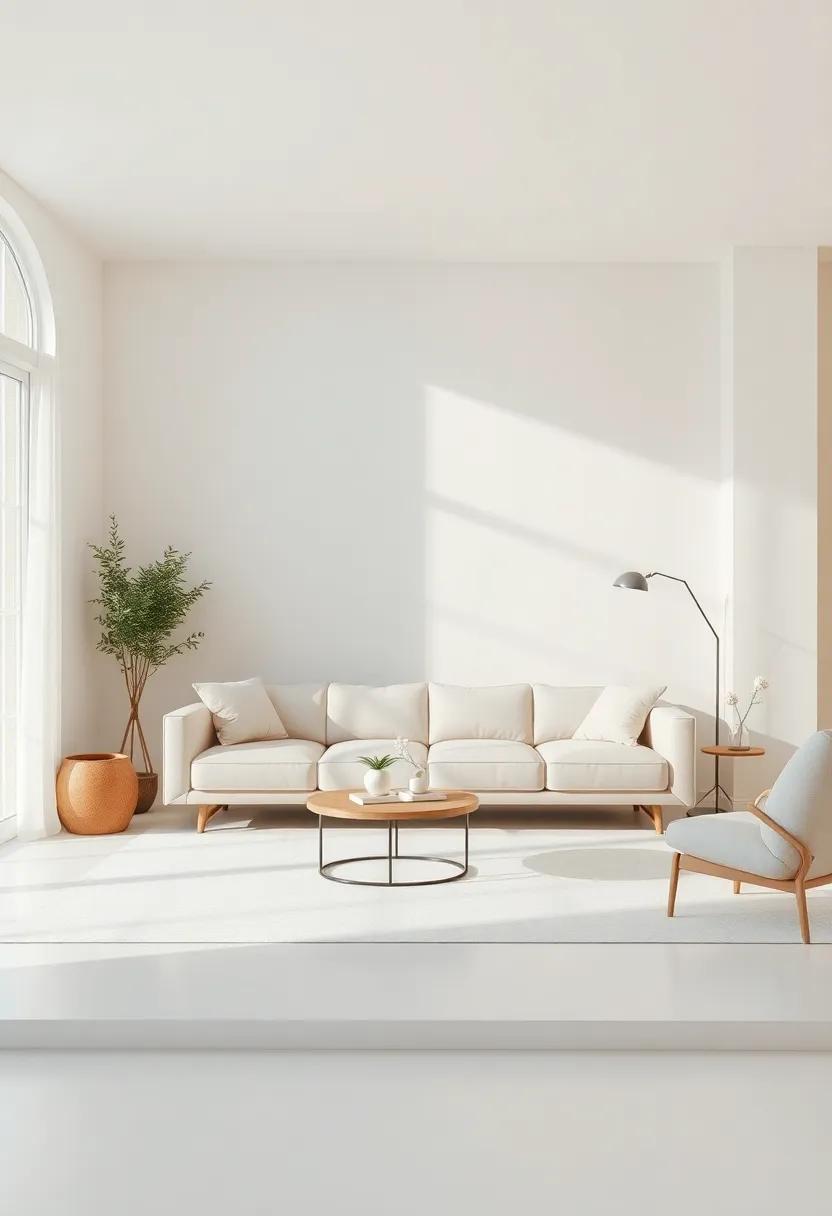
In the realm of soft minimalist design, texture serves as a bridge connecting the stark simplicity of minimalism with the warmth of a welcoming environment. It transforms the ambiance of living spaces by adding depth and interest without overcrowding the design. Emphasizing tactile experiences, various materials can be layered to create a harmonious balance. Consider the following elements:
- natural Fibers: Incorporate cotton, linen, or wool to invite softness.
- Wooden Accents: Use light-toned woods to introduce warmth while maintaining a clean aesthetic.
- Soft Surfaces: Throw blankets and plush cushions can soften rigid lines and evoke serenity.
Moreover, the interplay of light and shadow emphasizes these textured elements, forging a calm yet dynamic environment. This strategic layering enhances visual interest, encouraging an atmosphere that promotes relaxation and mindfulness. By thoughtfully selecting materials that complement each other,one can create a soothing narrative throughout the space. To illustrate this, let’s look at some common textures used in soft minimalist design:
| Material | Effect |
|---|---|
| Textured Rugs | Add comfort and definition to a lounging area. |
| Matte Finishes | Reduce glare, creating a peaceful visual experience. |
| Glass Elements | reflect light,enhancing openness without cluttering. |
Balancing Functionality and Aesthetic in Living Rooms
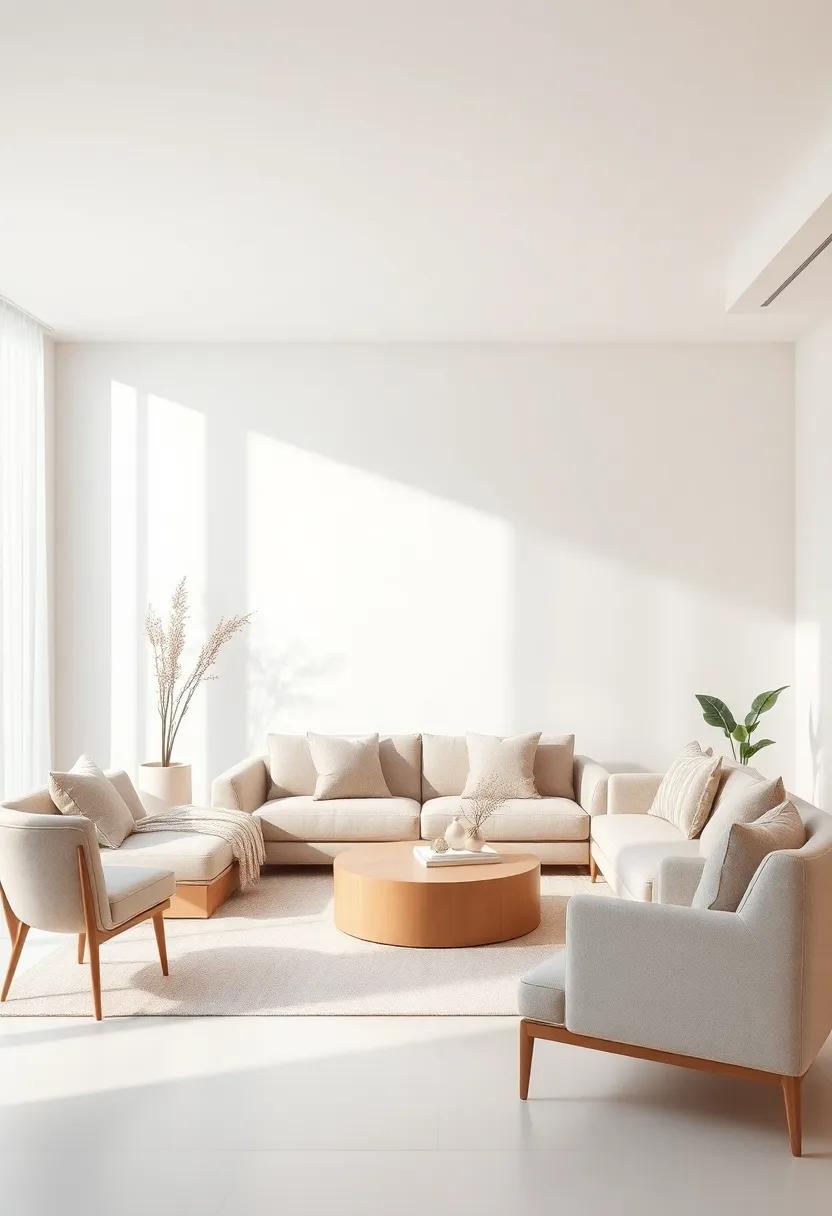
Creating a harmonious living room involves striking a perfect balance between functionality and aesthetics. In soft minimalist designs, this balance is often achieved through the selective use of furnishings and accessories that serve a purpose while contributing to a serene environment. Consider incorporating multi-functional furniture, such as:
- Ottomans with storage: These versatile pieces can double as seating and a place to stash away items, maintaining a clutter-free atmosphere.
- Expandable tables: Ideal for gatherings, they can be conveniently tucked away when not in use.
- Bookshelves with integrated lighting: These not only display your favorite reads but also enhance the room’s ambiance.
To further enhance the tranquil aesthetic, the color palette plays a crucial role. Soft pastel shades and neutral tones can create a calming effect, while textured fabrics add warmth and depth without overwhelming the senses. A well-thought-out arrangement of decor items is essential. Consider a simple table showcasing:
| Element | Purpose |
|---|---|
| plants | Adds a touch of nature and improves air quality. |
| Artwork | Injects personality and sparks conversation. |
| Candles | Creates a cozy atmosphere with soft lighting. |
Transforming Small Spaces Into Serene Oases
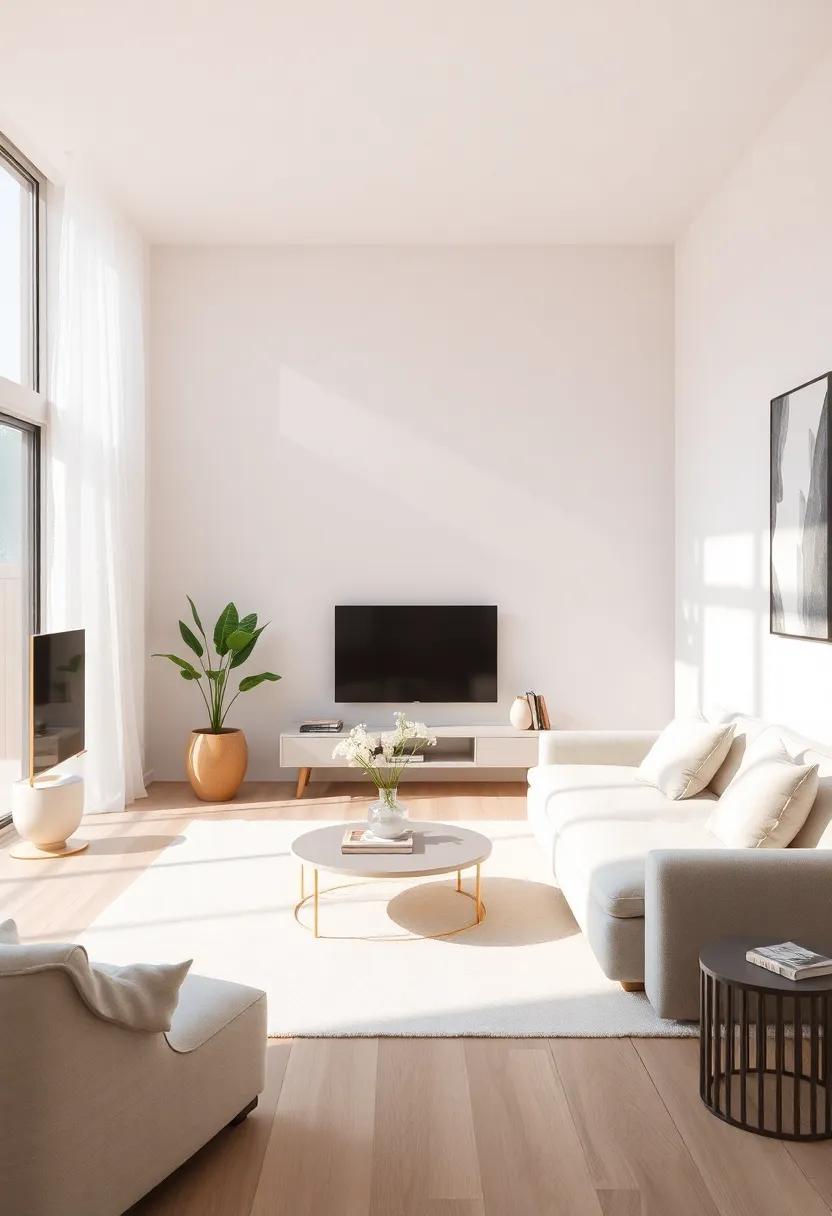
In a world that frequently enough feels overwhelmingly busy, the charm of a small, serene living space can serve as a haven of tranquility. By incorporating soft minimalist design principles, homeowners can transform compact areas into peaceful retreats that promote relaxation. Utilizing light tones—such as whites, creams, and pastels—creates an illusion of more space while fostering a soothing atmosphere. Key elements to integrate include:
- Natural Light: Maximize windows to invite sunlight, enhancing the airy feel.
- Functional Furniture: Choose pieces that serve dual purposes to avoid clutter.
- Textured fabrics: Layer soft textiles like cushions, throws, and rugs to provide warmth without overwhelming decor.
To further elevate the serenity of a small living room, consider a palette that emphasizes soft contrasts. for example, pairing muted shades and subtle patterns can create visual interest while retaining a calming essence. A well-thought-out layout encourages a harmonious flow, allowing for relaxation and connection. Below is a simple guide to help you choose elements that enhance tranquility in your space:
| Element | Color Suggestion | Visual Effect |
|---|---|---|
| Walls | Soft White | Brightens and opens up space |
| Accent Wall | Pale Blue | Adds depth and calm |
| Cushions | Light Gray | Neutral touch that complements |
| Area Rug | Beige | Warmth underfoot, unifying the space |
The Art of Negative Space in Decorating
Negative space, often overlooked in the pursuit of decorative splendor, plays a crucial role in creating a serene atmosphere within minimalist living rooms. By intentionally leaving areas uncluttered, you allow the design elements that do exist to breathe and garner attention. This approach is particularly effective in light-toned spaces, where soft hues foster a sense of calm. Key considerations for utilizing negative space include:
- Purposeful Placement: Arrange furniture and decor to create a harmonious flow.
- Uniform Color Palettes: Choose soft shades that seamlessly blend, reinforcing tranquility.
- Mindful Decor Selection: Opt for a few impactful pieces rather than overcrowding your space.
Incorporating negative space invites your eye to rest, allowing the simplicity of your surroundings to inspire peace. Soft, minimalist living rooms benefit from integrating thoughtful elements that accentuate emptiness while still feeling complete. Consider these strategies to maximize the beauty of empty spaces:
| Element | Effect |
|---|---|
| Large Windows | Invites natural light, amplifying openness. |
| Low Profile Furniture | Maintains sightlines, enhancing a spacious feel. |
| Textured Fabrics | Adds depth without visual clutter. |
incorporating Soft Furnishings for Comfort and warmth
Soft furnishings serve as the unsung heroes of cozy living spaces, effortlessly adding layers of comfort and warmth to minimalist designs. When styled thoughtfully, they can transform a serene environment into a welcoming haven. Consider incorporating textured throw pillows and lush blankets in varying shades of soft neutrals, which not only enhance visual appeal but also invite relaxation. A carefully draped throw over a muted sofa or a collection of cushions in different fabrics can create a harmonious blend that encourages both comfort and aesthetic balance.
To elevate the minimalist vibe while ensuring snugness,think about integrating a few key elements such as:
- Area Rugs: They anchor your space,providing warmth underfoot.
- Curtains: Light, flowing fabrics soften harsh edges and maintain an airy feel.
- Ottomans: Not just functional but also an prospect for textural contrast.
These details not only infuse personality but also enhance the overall ambiance.A well-chosen palette that embraces light tones allows these soft elements to shine while contributing to an inviting atmosphere that embodies tranquility.
Simplicity in Decor: The Beauty of Uncluttered Surfaces
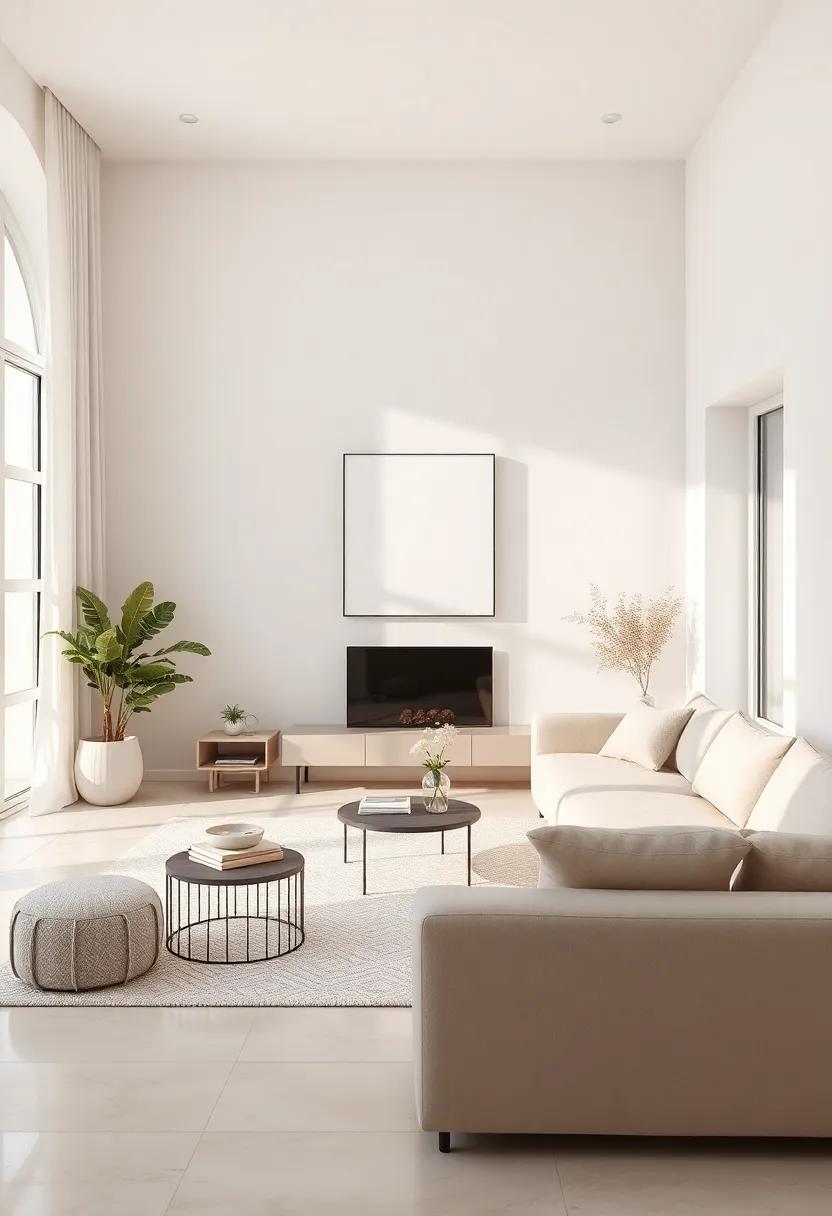
Simplicity is the cornerstone of a calming living environment. By embracing uncluttered surfaces, we allow the beauty of each element to resonate, creating a sense of peace and tranquility. Soft minimalist living rooms in light tones are characterized by their ability to highlight essential furnishings while minimizing distractions. Soft textures, natural materials, and a restrained color palette work seamlessly together to cultivate a serene atmosphere. The reduction of visual noise helps to foster mindfulness and relaxation, inviting both residents and guests to experience a deeper connection with the space.
To achieve this aesthetic, consider the following principles:
- Streamlined Furniture: Choose pieces with clean lines and functional designs that complement each other.
- neutral Color Scheme: Opt for shades of white, beige, or soft pastels that enhance the brightness of the room.
- Thoughtful Accessories: Limit decorative items to a few meaningful pieces that evoke emotions or memories.
- Natural Elements: Incorporate plants or organic materials to add a touch of vitality without overwhelming the senses.
| Element | Purpose |
|---|---|
| Furniture | Enhances functionality and space harmony |
| color | Promotes calmness and lightness |
| Accessories | Provides personal touch with minimal distraction |
| Plants | Brings life and freshness to the décor |
Natural Light: Enhancing Soft minimalist spaces
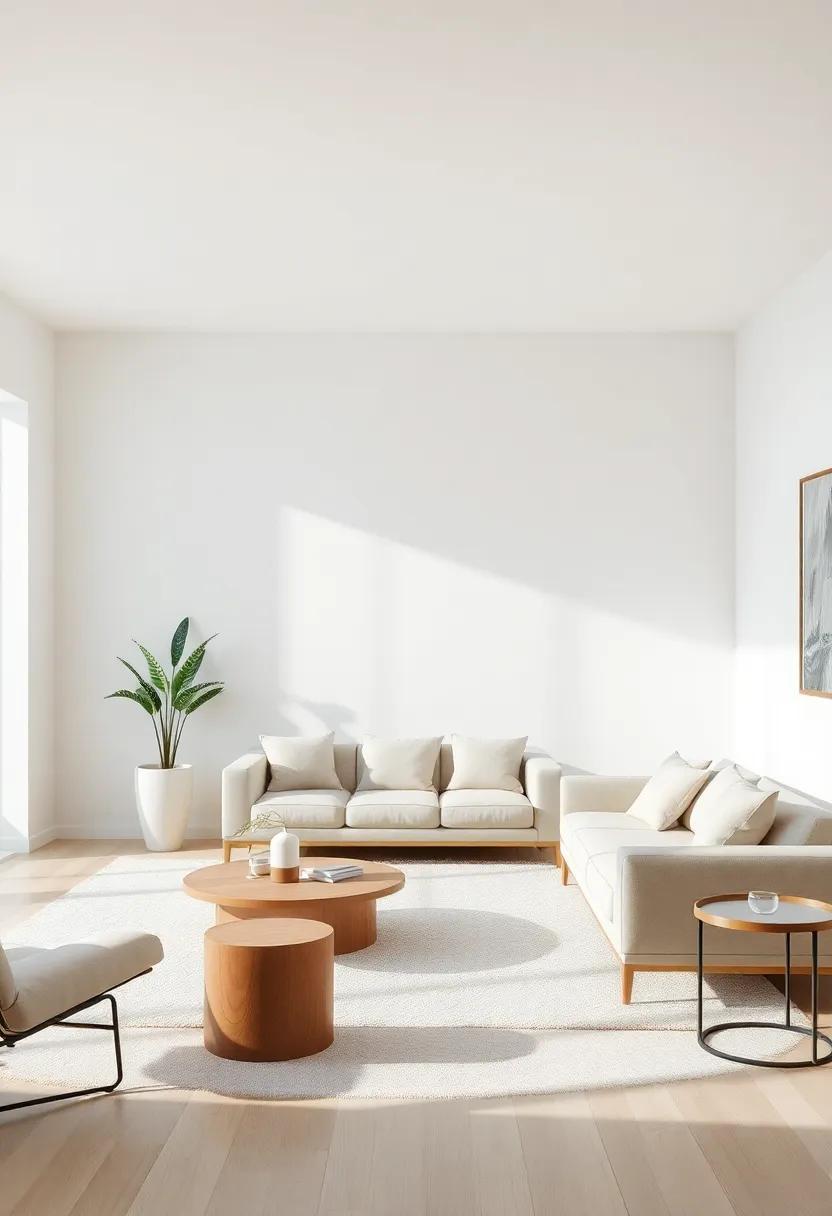
Natural light plays a pivotal role in soft minimalist designs, serving as the ultimate enhancer of space and tranquility. By allowing sunlight to stream through large windows or strategically placed openings, the essence of an airy environment is achieved. This approach highlights the subtle textures and gentle hues typical of minimalist aesthetics.The use of light can transform the perception of a room, making it feel expansive and inviting, while softly illuminating the palettes dominated by whites, creams, and muted pastels.
Incorporating large mirrors or reflective surfaces can further amplify the natural light, creating an illusion of depth. Consider using elements such as:
- Translucent curtains that diffuse light while maintaining privacy.
- Glass furnishings that blend seamlessly with their surroundings.
- Open shelving to promote a sense of openness.
- Indoor plants that not only thrive in natural light but also bring a touch of nature indoors.
To illustrate the harmony between light and soft minimalism, the following table summarizes key features to enhance these spaces:
| Feature | Description |
|---|---|
| Light Tones | Soft whites, beiges, and pastels that reflect light. |
| Natural Materials | Wood, stone, and linen that add warmth and texture. |
| Decluttered Spaces | A minimalist approach that invites calmness and focus. |
| Functional Decor | Pieces that are both stunning and serve a purpose. |
Thoughtful Lighting Choices for a Calm Ambiance
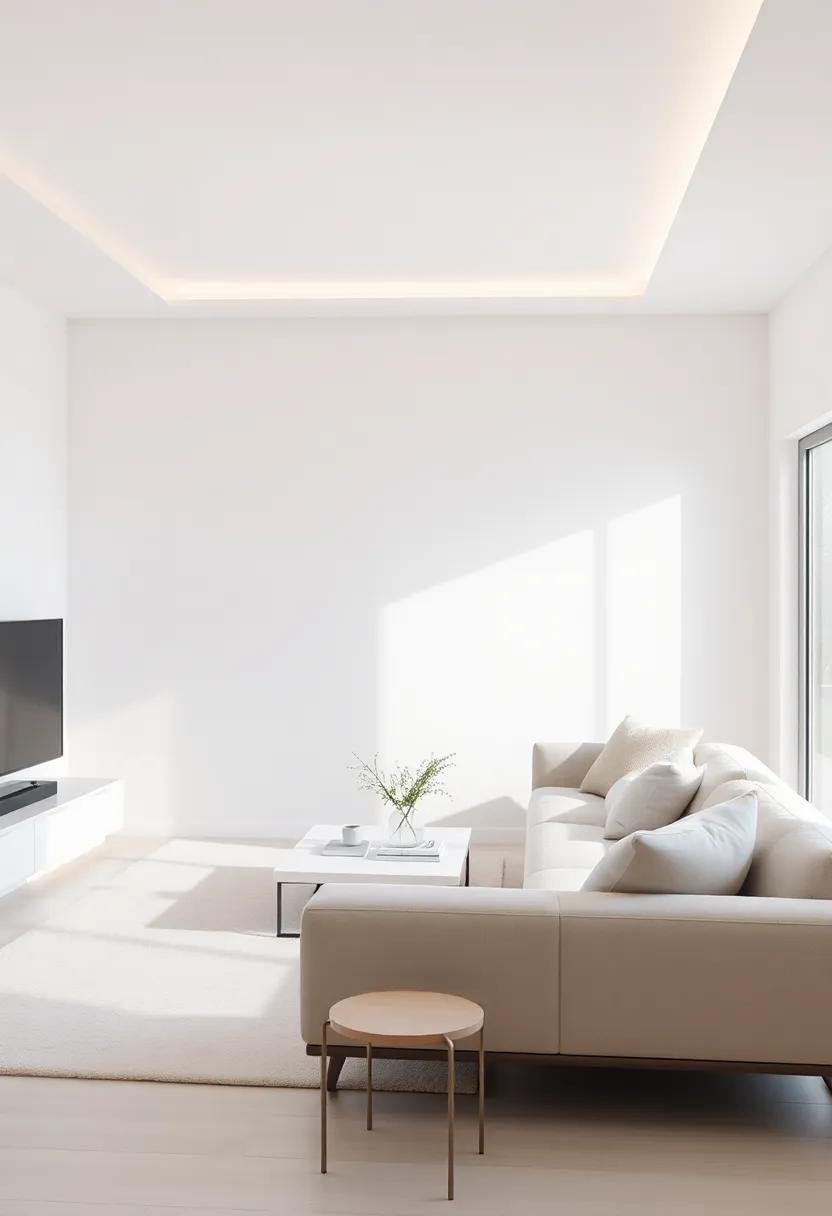
Creating a serene atmosphere in your living room revolves around the careful selection of lighting. Opt for fixtures that offer a gentle, diffused glow rather than harsh brightness, as this can transform even the starkest minimalist spaces into havens of calm. Consider these thoughtful lighting options:
- Soft LED Strips: Install behind furniture to create an ethereal glow.
- Dimmer switches: Adjustable lighting provides versatility for different moods.
- Natural Light Maximizers: Use sheer curtains to invite sunlight while maintaining privacy.
In addition to the fixture types, the layering of light plays a pivotal role. Combining ambient, task, and accent lighting ensures that your living room feels both functional and inviting. Remember to choose light tones for your fixtures and bulbs, as they complement a minimalist decor while enhancing the room’s tranquility. Here’s a speedy reference table on the best bulbs for various fixtures:
| Type of Fixture | Recommended Bulb | Color Temperature |
|---|---|---|
| Ceiling Lights | LED Globe Bulbs | 3000K (Warm White) |
| Table Lamps | Soft White LEDs | 2700K (Soft White) |
| Floor Lamps | Dimmer-Compatible Bulbs | 4000K (Cool White) |
Creating Focus Points with Subtle Design Elements
In the realm of soft minimalist living rooms, the art of subtlety takes center stage. To create focal points that resonate with tranquility, consider integrating design elements that whisper rather than shout. These elements can include textured fabrics like linen or soft cotton in soft beige or off-white,bringing a rich dimensionality while maintaining the serene aesthetic. Combine oversized light fixtures with delicate details to draw the eye upward, while gracefully framed wall art in muted pastels adds character without overpowering the room’s calm vibe.
Additionally, the strategic use of negative space plays a crucial role in forming tranquil zones within your living area. By opting for streamlined furniture arrangements, you can create areas of focus that invite relaxation and reflection. Complement these arrangements with natural accents, such as potted plants or wooden decor featuring subtle grains, that align with the light tonal scheme. To illustrate the impact of these elements, consider the following design combinations:
| Element | Description | Emotional Effect |
|---|---|---|
| Textured Throw Pillows | Add comfort and coziness. | Inviting |
| Soft Lighting | Creates a warm, ambient glow. | Relaxing |
| Neutral artwork | Enhances the visual flow. | Soothing |
| Indoor Plants | Brings in a touch of nature. | Refreshing |
Integrating Indoor Plants for Life and Serenity
Incorporating indoor plants into a living space not only enhances its aesthetic appeal but also fosters a sense of tranquility and well-being. The soft greens of foliage contrast beautifully with minimalist décor, creating a harmonious balance that soothes the senses. consider adding plants such as:
- Peace Lilies – Their elegant white blooms and air-purifying qualities make them a perfect companion for soft, light-toned spaces.
- Snake Plants – Known for their resilience, they bring vertical interest and a hint of color without overwhelming the room.
- pothos – Ideal for creating cascading effects, these trailing vines add a sense of life and motion to minimalist arrangements.
Positioning these plants in thoughtfully curated spots can elevate the serenity of your space. Try using a simple design element like a low wooden shelf or a ceramic planter to showcase their natural beauty. For a more organized plant display, consider the following:
| Plant | Light Requirements | Care Level |
|---|---|---|
| Peace Lily | Low to luminous indirect light | Easy |
| Snake Plant | low to bright indirect light | Very Easy |
| Pothos | Low to bright indirect light | Easy |
By thoughtfully selecting and positioning your indoor plants, you can create a serene environment that not only serves as an escape from the chaos of daily life but also promotes a healthier atmosphere. Let nature’s touch transform your minimalist sanctuary into a vibrant yet soothing retreat.
Cohesive Color Schemes: Soft Hues that Soothe
In a world filled with chaos and overstimulation, incorporating a palette of soft hues into your living space can work wonders for creating a tranquil atmosphere. The beauty of these understated colors lies in their ability to foster a sense of calm and balance, allowing the mind to unwind. Think gentle shades of powder blue, muted blush, and soft sage green—each one harmonizing to transform your minimalist living room into a serene sanctuary. when carefully selected, these colors not only enhance the aesthetic appeal but also improve the overall mood of the space.
To achieve a cohesive color scheme that soothes,consider the following elements:
- Accent Walls: A soft-colored wall can serve as the perfect backdrop for your furniture,providing a sense of depth without overwhelming the senses.
- Textiles: Incorporate cushions, throws, and rugs in similar soft shades or delicate patterns to add layers of comfort.
- Decorative Accessories: Choose decorative items in muted tones to maintain a sense of coherence while adding personal touches.
In choosing a cohesive approach, it’s essential to balance light and dark elements within your décor, ensuring that no single color dominates the space. Here’s a simple guide to harmonizing your soft hues:
| Color | Complementary Shade |
|---|---|
| Soft peach | Muted Cream |
| Pale Lavender | Cool Gray |
| Seafoam Green | Light sand |
Artful Arrangements: Curating your Minimalist Gallery
Creating a gallery that reflects the serenity of soft minimalist living requires a thoughtful selection of pieces that evoke calmness and simplicity. Start by considering the size and scale of your room; larger pieces can serve as focal points, while smaller works can be arranged in clusters to maintain balance. Utilize a soft color palette, favoring shades like whites, grays, and pale earth tones to complement the minimalist theme. Effective arrangements can include:
- Framed artwork in varying dimensions
- Natural elements such as driftwood or stones
- Subtle abstract sculptures that invite contemplation
Beyond merely displaying art, your gallery can express personal narratives through its arrangement. Consider a horizontal layout for a more conventional aesthetic, or a vertical display for a modern twist that draws the eye upward. Each piece should not only resonate with the others but also speak to the ambience of the space. Below is a simple guide to achieving harmony in your selection:
| Art Type | Recommended Style | Ideal Placement |
|---|---|---|
| Paintings | Soft,abstract | Above seating areas |
| Photographs | Black & white | Gallery wall arrangement |
| Sculptures | organic shapes | Corner or pedestal display |
selecting Furniture with Clean Lines and Simple Forms
In the quest for a serene living space,furniture that embodies simplicity and elegance plays a critical role. When selecting pieces, consider designs that exhibit clean lines and minimal ornamentation, allowing the eye to navigate the space effortlessly. Emphasizing functionality while minimizing visual clutter can create an atmosphere that promotes relaxation. Opt for sofas with smooth silhouettes, coffee tables that boast unobtrusive legs, and accent chairs that blend seamlessly into the backdrop while still providing comfort. Elements such as the following can elevate your minimalist aesthetic:
- Neutral Upholstery: Choose fabrics in light tones to maintain an airy feel.
- Natural Materials: Incorporate wood, metal, or glass for a touch of organic sophistication.
- Geometric Shapes: Favor rounded or angular forms that add subtle interest without overwhelming.
Pairing these furniture choices with intentional placement can amplify the tranquility of your living room. Create a cohesive flow by arranging items with an emphasis on balance and proportion. Here’s a simple guide to help you visualize your layout:
| Furniture Piece | Recommended Placement |
|---|---|
| Sofa | Against the longest wall to create an inviting focal point. |
| Coffee Table | Centered in front of the sofa, ensuring ample walking space. |
| Accent Chairs | Flanking the sofa or slightly angled for a conversational arrangement. |
The Impact of Open Spaces in Fostering Peace
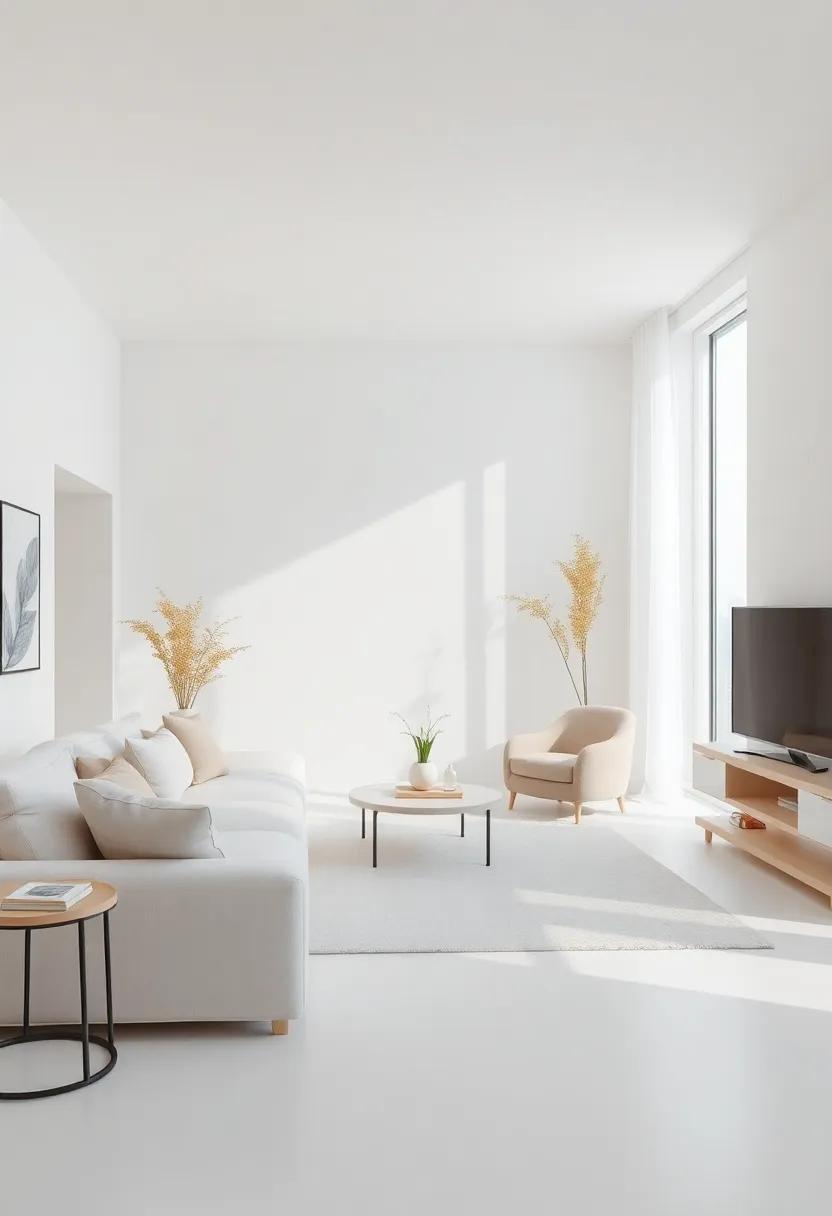
Open spaces serve as a vital sanctuary in today’s fast-paced world, offering a breath of fresh air and a glimpse of tranquility. The soft hues and minimalist approach in living room design reflect this essence,allowing individuals to breathe freely and restore their mental balance. By incorporating elements such as natural lighting and uncluttered layouts, these spaces can effectively diminish feelings of stress, making them ideal zones for mindfulness and meditation. the interplay between light tones and natural materials, such as wood and linen, fosters a connection to nature, promoting a sense of calm and enhancing the overall aesthetic of serenity.
Moreover, the strategic use of open spaces can encourage community interaction and connection, which are essential for personal peace. Within these environments, residents can enjoy a sense of belonging while appreciating the open air.Adopting soft minimalist designs not only unifies the space but also allows for versatile functionality—making it suitable for both relaxation and social gatherings.The charm of an open layout can be summarized with the following key features:
- Adequate natural light: Invites positivity and warmth.
- Neutral color palettes: Create a soothing atmosphere.
- Strategic furnishings: Encourage flow and movement.
| Aspect | Benefit |
|---|---|
| Natural Ventilation | Enhances air quality |
| Greenery Integration | Reduces stress levels |
| Flexible layouts | promotes creativity |
Inviting Scandinavian Influences into your Living Room
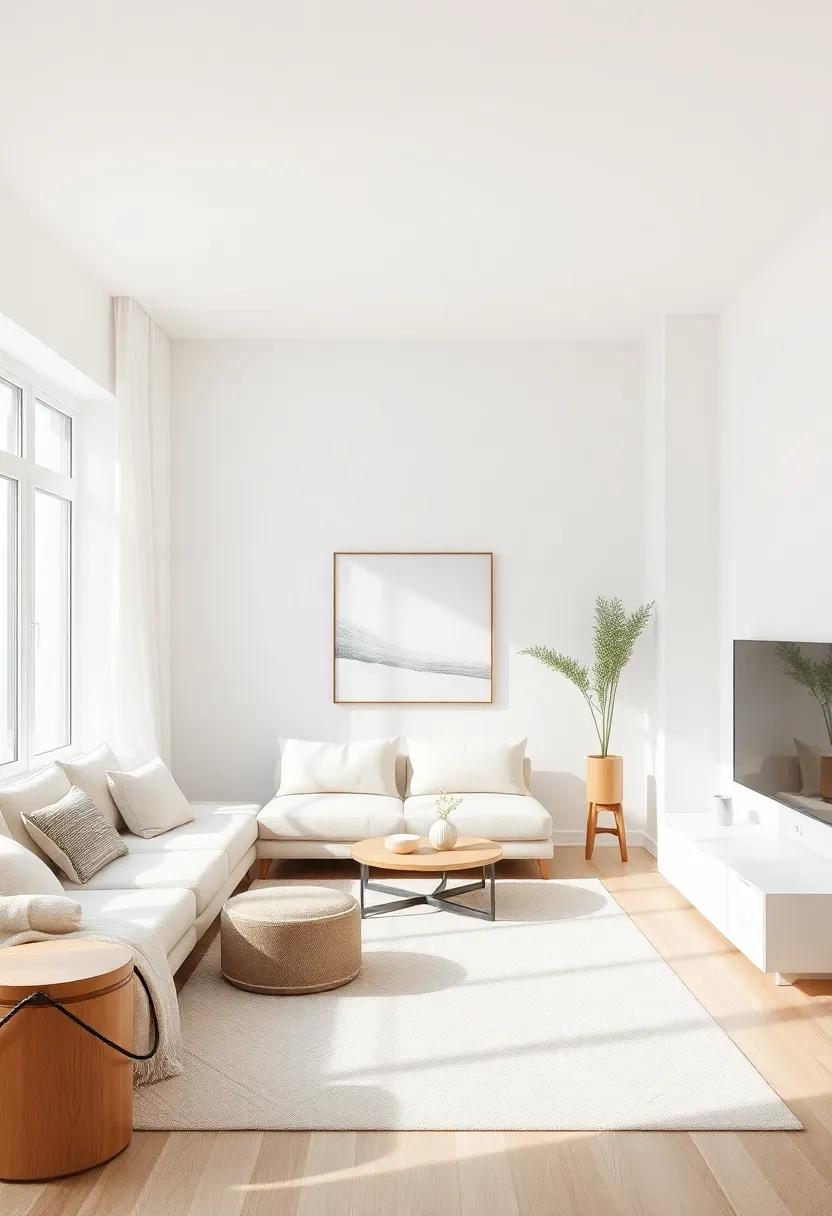
Incorporating Scandinavian influences into your living space opens the door to a realm of tranquility and unparalleled comfort. Start by selecting furniture that emphasizes functionality and simplicity, favoring pieces with clean lines and organic shapes. A few key elements can elevate your living room:
- Light-colored woods: Furniture crafted from ash or birch brings warmth and a natural touch.
- Textured textiles: Integrate soft throws and plush cushions in neutral hues to invite coziness.
- Natural light: Maximize windows and opt for sheer curtains to create an airy atmosphere.
To maintain the serene aesthetic characteristic of Scandinavian design, stick to a subdued color palette. Light tones, such as soft whites, pale greys, and muted pastels, serve as an ideal backdrop. Consider adding accents through understated decor items that reflect the beauty of the outdoors. A small table displaying a mix of:
| Accent Item | Description |
|---|---|
| Bohemian plant | Brings life without overwhelming the space. |
| Handcrafted ceramic vase | Adds a unique touch with a subtle art element. |
| Simple wall art | Enhances walls without drawing too much attention. |
With these elements, your living room will embody the essence of Scandinavian design, promoting a sense of peace and understated elegance.
The Power of Soft Curtain Textiles in Enhancing Serenity
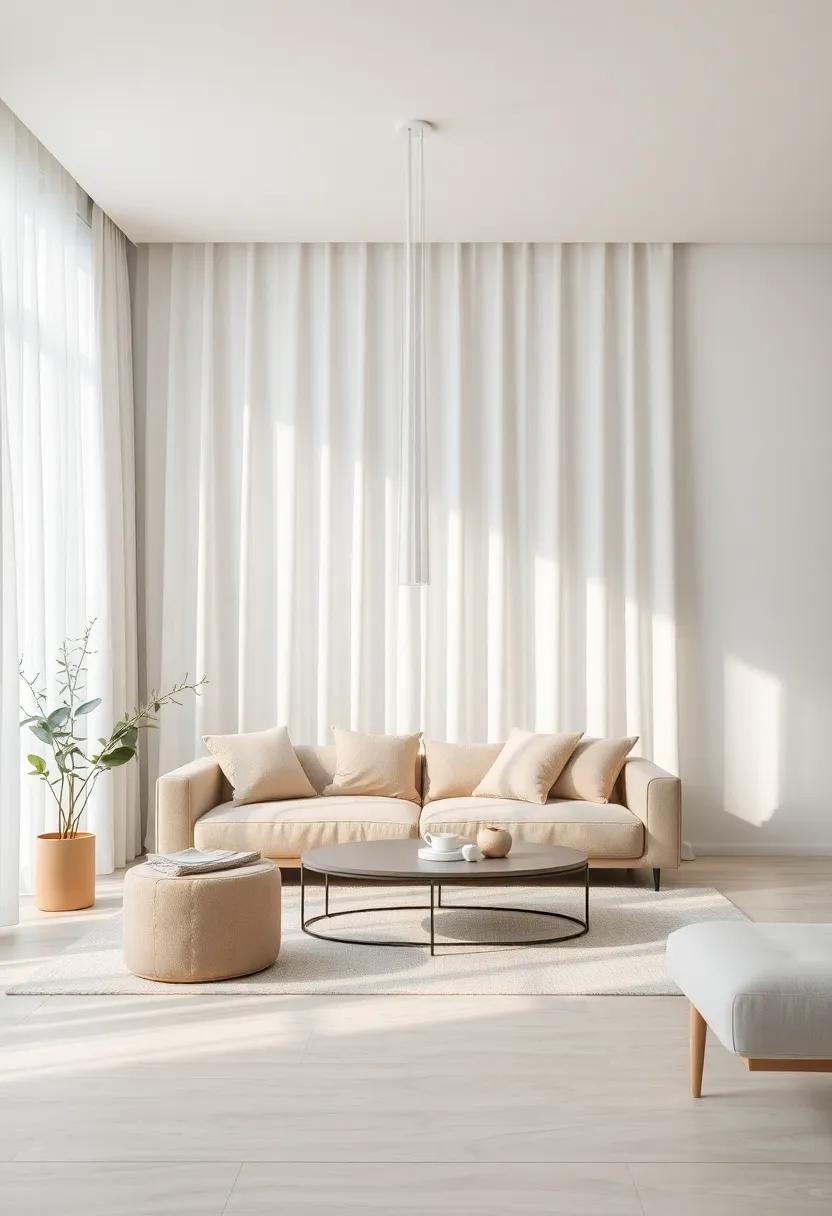
Soft curtain textiles play a vital role in transforming any space into a tranquil retreat, offering a unique ability to enhance the ambiance of minimalist living rooms. These delicate fabrics, frequently enough draped in soothing light tones, contribute to a gentle play of light and shadow, creating a serene atmosphere that invites relaxation. The tactile and visual softness of these textiles not only provides an aesthetic appeal but also fosters a sense of peace, making the living room a sanctuary for unwinding after a long day.
Moreover, the versatility of soft curtains allows for seamless integration into various design schemes, from airy whites to muted pastels. By choosing lightweight and flowing fabrics, you can achieve an ethereal quality that softens harsh lines and adds depth to your decor. Consider the following features of soft curtain textiles that further enhance serenity in your living space:
- Natural Light Filtering: Soft curtains filter sunlight,preventing glare while still illuminating the room.
- Sound absorption: These textiles help absorb sound, minimizing noise and creating a more tranquil environment.
- Textural Diversity: Variety in fabrics such as linen, cotton, or sheer materials adds richness to the room.
- Easy Maintenance: Lightweight materials are frequently enough easier to clean and maintain, allowing you to focus on relaxation.
Final Touches: Personalizing minimalist Living Rooms
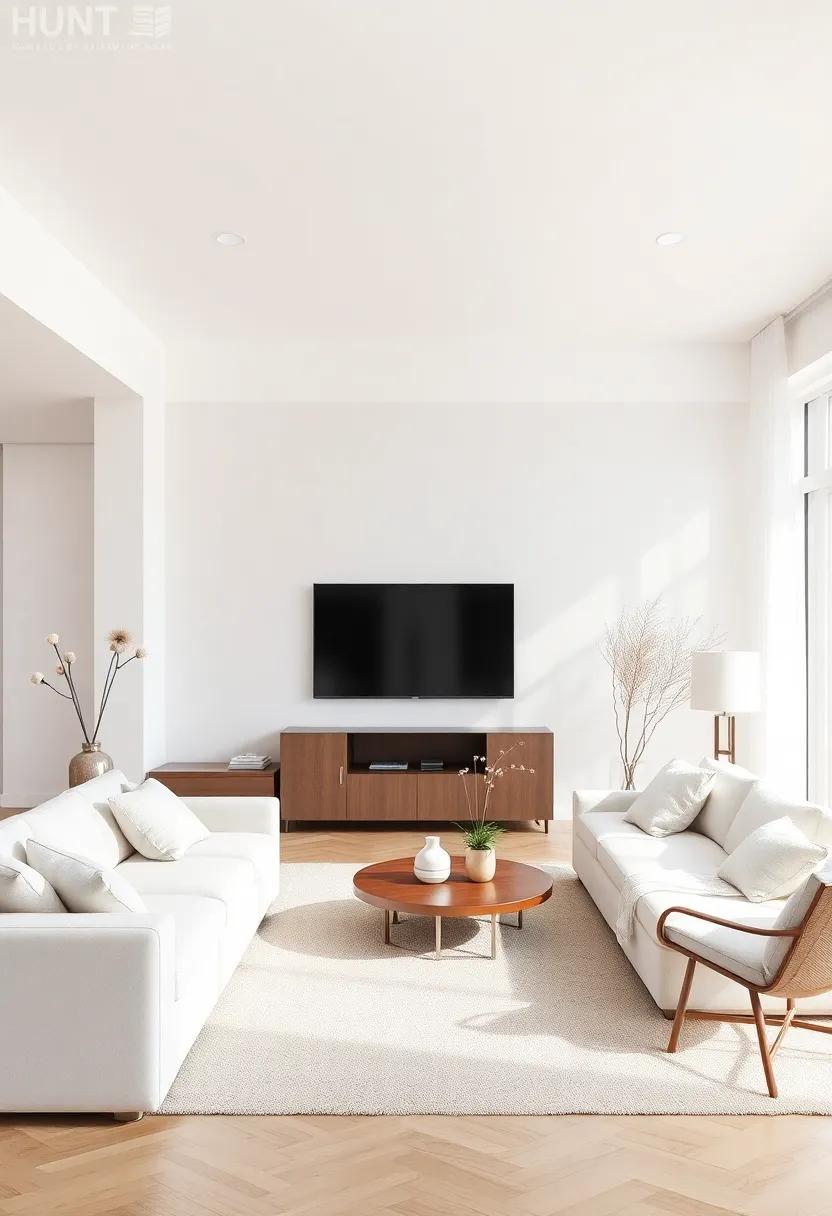
To create a truly personalized and inviting atmosphere in your minimalist living room, consider incorporating elements that reflect your unique style and preferences. Choose a few standout pieces that speak to you and enhance the serene ambiance without overwhelming the space. Ideas might include:
- Artistic Accents: Add a single striking artwork or a series of small,cohesive pieces that draw attention without cluttering.
- Natural Elements: Introduce greenery through low-maintenance plants, such as succulents or snake plants, to bring life and freshness.
- Textural contrasts: Use cushions, throws, or a soft rug in varying textures to add warmth and depth while maintaining a visually calming palette.
Additionally, careful lighting can play a pivotal role in personalizing your minimalist space. Opt for fixtures that not only provide illumination but also serve as statement pieces. Consider these lighting options:
| Lighting Type | Benefits |
|---|---|
| floor Lamps | provide ambient lighting and a sculptural element to the room. |
| Table Lamps | Create cozy reading nooks and highlight surfaces like coffee tables. |
| Wall Sconces | Free up space while adding character and focused light. |
finding Balance: A Harmonious Blend of Soft and Strong Elements
in a world that often feels chaotic, creating a living room that melds softness with strength fosters an atmosphere of tranquility. By incorporating gentle,muted colors such as pale blues,soft grays,and creamy whites,you can establish a serene backdrop that soothes the senses. Balance is further enhanced through the use of textured fabrics, soft throws, and natural materials, which invite comfort and warmth. Consider adding elements like:
- Cotton or linen cushions for a plush feel
- Wooden accents to introduce a sense of nature
- Glass or ceramic decor to reflect light and add elegance
While soft elements create a calming environment, incorporating strong furnishings can provide the necessary contrast to maintain visual interest. A bold coffee table or a striking piece of artwork can stimulate conversation and draw the eye. Pairing these elements with subtle lighting solutions, such as dimmable floor lamps or wall sconces, allows for versatility in mood. To visualize this harmonious blend, consider the following table that highlights how various elements can coexist:
| Element | Soft Features | strong Features |
|---|---|---|
| Cushions | Plush fabric, light tones | Textured patterns, bold colors |
| Furniture | low-profile sofas, rounded edges | Geometric coffee tables, sturdy frames |
| Lighting | Warm ambient lighting | Statement pendant fixtures |
Designing Spaces for Reflection and Mindfulness
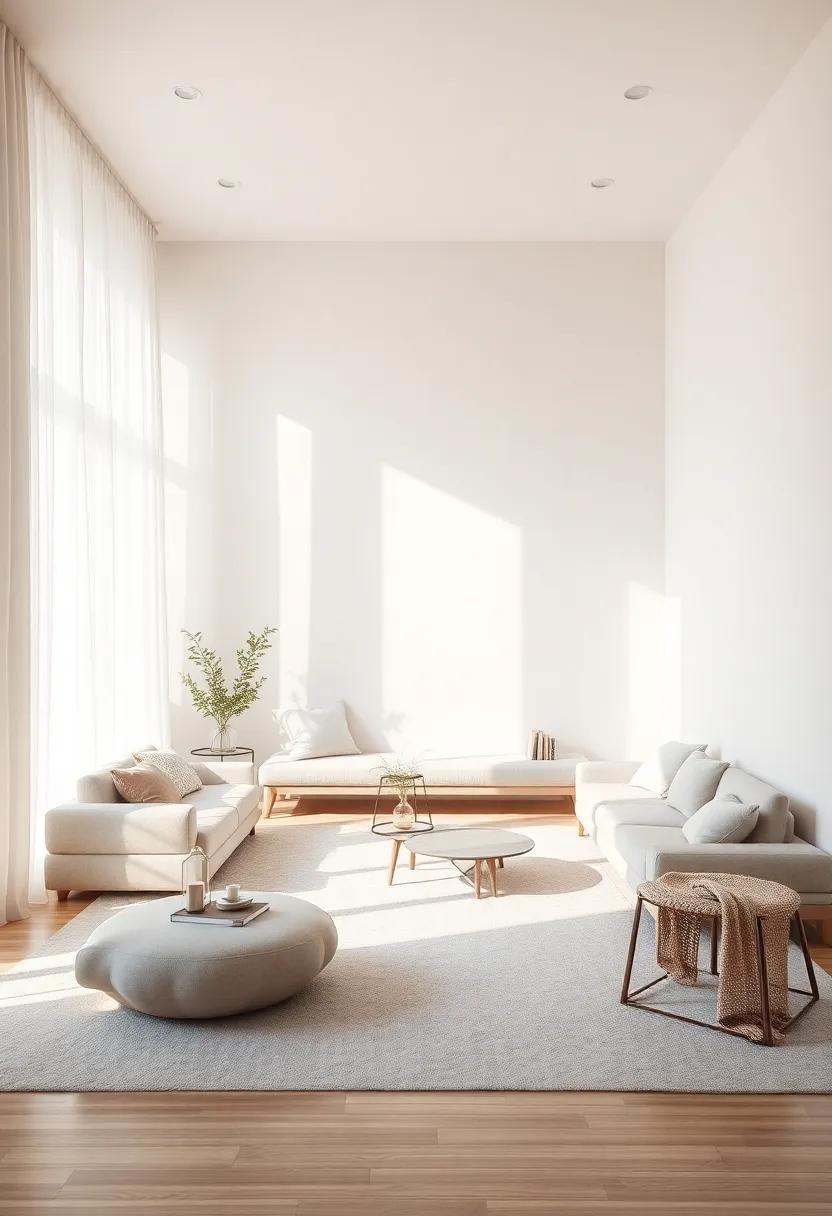
Creating a space that fosters reflection and mindfulness involves more than just aesthetics; it requires thoughtful consideration of elements that promote tranquility and awareness. Soft minimalist design elevates this intention by utilizing light tones and uncluttered layouts, allowing the mind to breathe and focus. Key features to incorporate include:
- Natural Light: Windows that invite daylight to dance across the room,illuminating textures without overwhelming.
- Textural Contrast: Elements like a soft cotton throw or a handcrafted wooden table can create visual interest while maintaining simplicity.
- Indoor Plants: Incorporate greenery, which not only purifies the air but also rejuvenates the spirit and brings life into the space.
- Mindful Decor: Select artwork or decor that resonates with calmness, avoiding busy patterns that can disrupt focus.
Another vital aspect is the arrangement of furniture to foster a sense of openness and flow. Using a minimalist approach means prioritizing purposeful pieces over excess. consider the following layout ideas:
| element | Purpose |
|---|---|
| Low-profile Seating | Encourages relaxation and a grounded feeling. |
| Multi-functional Furniture | Maximizes space while eliminating clutter. |
| Soft Rugs | Add warmth and comfort, making the space inviting. |
By designing mindful spaces that encourage personal reflection, we can cultivate environments that not only represent aesthetic beauty but also serve as havens for serenity in our daily lives.
The Allure of Soft Minimalist Living Rooms: A Lasting Trend
The charm of soft minimalist living rooms lies in their ability to create a serene escape from the chaos of everyday life. Bathed in light tones, these spaces radiate a calming energy, allowing the mind to unwind and recharge. Key elements that define this aesthetic include:
- Neutral Palettes: Shades of white, beige, and pale gray establish a tranquil foundation that enhances the feeling of openness.
- Natural Textures: Soft furnishings made from organic materials like linen and cotton add warmth and comfort without overwhelming the senses.
- Sleek Lines: Simple furniture silhouettes and unobtrusive decor contribute to a clean, uncluttered environment.
In designing a soft minimalist living room,the emphasis is on creating a harmonious balance between functionality and aesthetics.Thoughtfully selected pieces—like a plush sofa in a soft cream, paired with a light wood coffee table—invite relaxation while maintaining simplicity. To further enhance the atmosphere, consider integrating elements such as:
| Element | Description |
|---|---|
| Natural Light | Large windows or sheer curtains allowing sunlight to diffuse gently into the space. |
| Greenery | Potted plants or minimal floral arrangements that add a touch of life without visual clutter. |
| Artistic Touches | Abstract art or monochrome photography that complements the soft tones while serving as focal points. |
The Way Forward
As we draw the curtains on our exploration of soft minimalist living rooms, it becomes clear that the allure of light tones extends far beyond mere aesthetics. These serene spaces invite us to pause and breathe, encouraging a sense of calm in our often chaotic lives. In embracing simplicity and tranquility, we find not just a visual appeal, but a deeper connection to ourselves and our environments.
Letting go of excess allows us to curate not just our homes, but our experiences and emotions, shaping an atmosphere of peace and clarity. As you consider your own living space, may you be inspired to infuse it with the gentle touch of minimalism, creating a refuge that reflects both beauty and serenity.
it’s about more than just a style; it’s about crafting a sanctuary where simplicity reigns, cultivating joy in every soft hue and deliberate detail. Embrace the allure of light tones, and let your living room become a canvas of tranquility in your everyday life.

